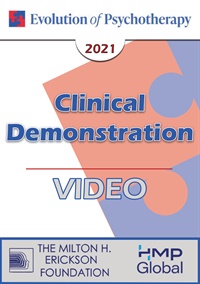EP21 Clinical Demonstration 05 - Creative Transformation in Generative Psychotherapy - Stephen Gilligan, PhD
- Average Rating:
- Not yet rated
- Topic Areas:
- Clinical Demonstrations | Generative Psychotherapy | Psychotherapy | Art and Creativity
- Categories:
- Evolution of Psychotherapy | Evolution of Psychotherapy 2021
- Faculty:
- Stephen Gilligan, PhD
- Course Levels:
- Master Degree or Higher in Health-Related Field
- Duration:
- 1 hour
- Format:
- Audio and Video
- Original Program Date:
- Dec 02, 2021
- License:
- Never Expires.
Description
This demonstration will show how activating a client's creative process is the key factor in generative psychotherapy. This process follows these steps:
(1) Opening a creative safe space
(2) Identifying a goal (A positive change or transforming a negative pattern)
(3) Identifying and welcoming both obstacles and resources
(4) Weaving and integrating the parts into a new "mosaic of self"
(5) Orienting to future application of changes.
Therapy is successful when clients are able to experientially realize positive life changes. While the identification and transformation of symptoms is important in this regard, the activation of the client's creative capacity to change is even more important. This paper outlines 6 steps in this therapeutic process: (1) opening a mindful field, (2) setting positive intentions, (3) developing and maintaining a creative state, (4) identifying a "storyboard" for achieving goals, (5) transforming negative experiences, and (6) everyday practices. Methods and case examples will be given to illuminate this core process.
Learning Objectives
-
Demonstrate how symptoms can become solutions under proper conditions
-
Demonstrate 3 ways to practically activate a client's creative change potential
-
Demonstrate how to integrate conflicting parts into a new self-wholeness
Credits
Faculty

Stephen Gilligan, PhD Related Seminars and Products
Stephen Gilligan Ph.D., is a Psychologist in Encinitas, CA. He was one of the original NLP students at UC Santa Cruz; Milton Erickson and Gregory Bateson were his mentors. After receiving his psychology doctorate from Stanford University, he became one of the premier teachers and practitioners of Ericksonian hypnotherapy. This work unfolded into his original approaches of Self-Relations and Generative Self, and then further (in collaboration with Robert Dilts) into Generative Coaching. These different traditions have all been updated and integrated into the present Generative Change Work, which includes the applications of Generative Coaching, Generative Psychotherapy, Generative Trance, Hero’s Journey, and Systemic Change work.


